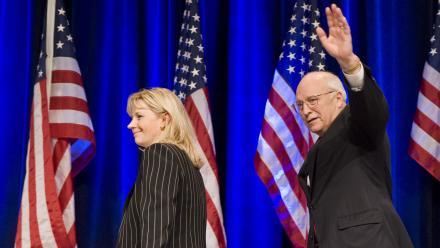
What is in a name? In politics, name association can mean everything. Tied to a scandal, a name can hinder performance at the polls; other times, a name can bring national recognition, which not unlike Corey Booker, may help you at the polls. What if your popularity doesn’t stem with anything that you have done in particular, but who your family is? What if your surname was a politically valuable tool?
The political value of families can feel like nepotism, but the association of being tied to powerful political elites can make public office a much easier choice. Look for Liz Cheney in the upcoming Wyoming Republican Primary against incumbent Senator Mike Enzi. The Washington Post quotes one Republican strategist as saying that normally, “… an incumbent with a solid record and without scandal would be safe, but usually that incumbent isn’t going up against someone with a name like that”.
Senator Enzi has largely voted on party lines and the political platforms of the two candidates are mostly similar; the race is not a question of political values, but of sheer popularity Cheney might only have because of her surname. Cheney is largely campaigning against the Senator by advocating that Sen. Enzi is a tenured politician and that “seniority” in politics should be challenged. Cheney’s familial ties bring media coverage and a larger pool to fundraise from. Truthfully, Sen. Enzi has always struggled with fundraising, the Post also reports.
To minimize the impact that Cheney’s wealth has on her campaign strategy would be unwise, but some suggest that the race may be a strategically easy win for the daughter of the former Vice-President.
Political Families Extended
However, Cheney is not the only politician to benefit from family association. Obviously one may think of George W. Bush, who became President shortly after his father and then his brother Jebb Bush is the Governor of Florida. Long-time Senator Edward “Ted” Kennedy governed Massachusetts by using the Kennedy name as an asset. The Kennedy name has become a brand in American politics, a seemingly democratic alternative to the Royal Family.
America is not alone in cultivating powerful political families. Although the Kennedy family may be America’s most iconic political family, India’s Gandhi family has been said to have no political peer in the world. The Gandhi family, not related to Mahatma Gandhi, has held a powerful political position in office since India’s independence, working largely through the Indian National Congress Party. Five generations of Nehru-Gandhi members have held persuasive political power in Indian politics, most recently, Rahul Gandhi who is the Vice President of the congress. The Indian political system has had a Gandhi in political power since it’s conception.
It would seem that even in democratic politics, voters are not disillusioned with nepotism. Does coming from a good family give you more credibility as a candidate? It would be an unsafe assumption to assume that that all relatives from political families will run successfully for office. Rather, I think that a more interesting question would be to wonder when coming from a political family has hurt a political candidate for office.
Adrian Tawfik says
I really agree that political families have become a problem in the US and in places like India and Philippines. Hillary Clinton represents the same problem for me, just like Bush Jr. she didn’t enter politics as a nobody. We are a giant country and we can find someone who doesn’t have ties to an old leader. I like leaders who came out of nowhere to politics anyway.